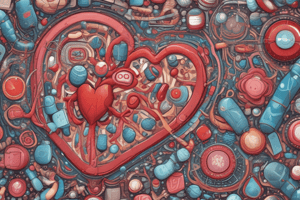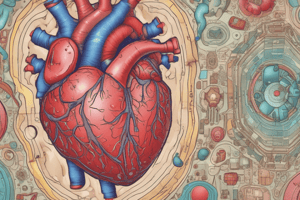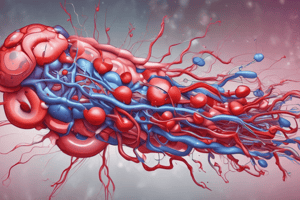Podcast
Questions and Answers
What is a potential consequence of using beta blockers in combination with grapefruit juice?
What is a potential consequence of using beta blockers in combination with grapefruit juice?
- Intensified effects of beta blockers (correct)
- Increased heart rate
- Reduced efficacy of beta blockers
- Decreased blood pressure
Which of the following medications is suitable for use in infants?
Which of the following medications is suitable for use in infants?
- Verapamil (correct)
- Propranolol
- Diltiazem
- Nifedipine
What is the primary mechanism of action for verapamil?
What is the primary mechanism of action for verapamil?
- Alpha-adrenergic receptor stimulation
- Vasodilation
- Beta-adrenergic receptor blockade
- Calcium channel blockade (correct)
What is a common side effect of nifedipine, particularly with the immediate-release formulation?
What is a common side effect of nifedipine, particularly with the immediate-release formulation?
Which of the following medications is available in both immediate-release and slow-release formulations?
Which of the following medications is available in both immediate-release and slow-release formulations?
What is the primary therapeutic effect of diltiazem?
What is the primary therapeutic effect of diltiazem?
Which of the following conditions is a contraindication for the use of beta blockers?
Which of the following conditions is a contraindication for the use of beta blockers?
What is the recommended dosage of nifedipine for immediate-release and slow-release formulations?
What is the recommended dosage of nifedipine for immediate-release and slow-release formulations?
What is a common adverse effect of loop diuretics?
What is a common adverse effect of loop diuretics?
What is a side effect of spironolactone that is not seen with loop diuretics?
What is a side effect of spironolactone that is not seen with loop diuretics?
Which of the following is a therapeutic effect of both loop diuretics and spironolactone?
Which of the following is a therapeutic effect of both loop diuretics and spironolactone?
What is a common indication for the use of loop diuretics?
What is a common indication for the use of loop diuretics?
What is a mechanism of action of spironolactone?
What is a mechanism of action of spironolactone?
What is a common adverse effect of loop diuretics that can lead to hypotension?
What is a common adverse effect of loop diuretics that can lead to hypotension?
How would you monitor for ototoxicity as a side effect of loop diuretics?
How would you monitor for ototoxicity as a side effect of loop diuretics?
What is a comparative efficacy of spironolactone compared to loop diuretics?
What is a comparative efficacy of spironolactone compared to loop diuretics?
What is a side effect of loop diuretics that is not seen with spironolactone?
What is a side effect of loop diuretics that is not seen with spironolactone?
How would you monitor for hyperkalemia as a side effect of spironolactone?
How would you monitor for hyperkalemia as a side effect of spironolactone?
What is the primary effect of calcium channel blockers on the heart?
What is the primary effect of calcium channel blockers on the heart?
Which of the following medications has a similar effect on the heart as beta blockers?
Which of the following medications has a similar effect on the heart as beta blockers?
What is the mechanism of vasodilation caused by calcium channel blockers?
What is the mechanism of vasodilation caused by calcium channel blockers?
Which of the following is a common effect of calcium channel blockers on blood vessels?
Which of the following is a common effect of calcium channel blockers on blood vessels?
What is the primary effect of calcium channel blockers on vascular smooth muscle cells?
What is the primary effect of calcium channel blockers on vascular smooth muscle cells?
What is the primary site of action of calcium channel blockers?
What is the primary site of action of calcium channel blockers?
What is the primary effect of Angiotensin II on blood vessels?
What is the primary effect of Angiotensin II on blood vessels?
What is the role of juxtaglomerular cells in the RAAS pathway?
What is the role of juxtaglomerular cells in the RAAS pathway?
What is the effect of aldosterone on kidney tubules?
What is the effect of aldosterone on kidney tubules?
What is the site of conversion of Angiotensin I to Angiotensin II?
What is the site of conversion of Angiotensin I to Angiotensin II?
What is the effect of Angiotensin II on blood pressure?
What is the effect of Angiotensin II on blood pressure?
What is the role of the adrenal cortex in the RAAS pathway?
What is the role of the adrenal cortex in the RAAS pathway?
What is the stimulus for renin secretion by juxtaglomerular cells?
What is the stimulus for renin secretion by juxtaglomerular cells?
What is the effect of Angiotensin II on aldosterone production?
What is the effect of Angiotensin II on aldosterone production?
What is the site of action of Angiotensin II in terms of blood pressure regulation?
What is the site of action of Angiotensin II in terms of blood pressure regulation?
What is the effect of aldosterone on blood volume?
What is the effect of aldosterone on blood volume?
What is the effect of grapefruit juice on the action of beta blockers?
What is the effect of grapefruit juice on the action of beta blockers?
Which of the following calcium channel blockers can be used in infants?
Which of the following calcium channel blockers can be used in infants?
What is the primary mechanism of vasodilation of nifedipine?
What is the primary mechanism of vasodilation of nifedipine?
What is the primary therapeutic effect of diltiazem?
What is the primary therapeutic effect of diltiazem?
What is the primary difference between the immediate-release and slow-release formulations of nifedipine?
What is the primary difference between the immediate-release and slow-release formulations of nifedipine?
What is the effect of verapamil on the heart rate?
What is the effect of verapamil on the heart rate?
What is the primary therapeutic effect of nifedipine?
What is the primary therapeutic effect of nifedipine?
What is the effect of reflex effects on the heart rate?
What is the effect of reflex effects on the heart rate?
What diuretic is commonly used in patients with low GFR (renal impairment)?
What diuretic is commonly used in patients with low GFR (renal impairment)?
Which electrolyte imbalance can occur when taking diuretics?
Which electrolyte imbalance can occur when taking diuretics?
What patient education should be provided when prescribing Furosemide?
What patient education should be provided when prescribing Furosemide?
Which of the following drugs should be avoided when taking Furosemide?
Which of the following drugs should be avoided when taking Furosemide?
What is the main difference between a loop diuretic and a thiazide diuretic?
What is the main difference between a loop diuretic and a thiazide diuretic?
What is a contraindication for using Hydrochlorothiazide?
What is a contraindication for using Hydrochlorothiazide?
What is a common side effect of Furosemide?
What is a common side effect of Furosemide?
What type of diuretic is Spironolactone?
What type of diuretic is Spironolactone?
What is the main reason why Spironolactone (Aldactone) would be prescribed?
What is the main reason why Spironolactone (Aldactone) would be prescribed?
What is a potential adverse effect of Spironolactone (Aldactone)?
What is a potential adverse effect of Spironolactone (Aldactone)?
What should be monitored when prescribing Spironolactone (Aldactone) to a patient?
What should be monitored when prescribing Spironolactone (Aldactone) to a patient?
Why would you instruct a patient taking Spironolactone (Aldactone) to restrict potassium-rich foods?
Why would you instruct a patient taking Spironolactone (Aldactone) to restrict potassium-rich foods?
What type of diuretic is Triamterene (Dyrenium)?
What type of diuretic is Triamterene (Dyrenium)?
What is the mechanism of action of Triamterene (Dyrenium)?
What is the mechanism of action of Triamterene (Dyrenium)?
When would you avoid prescribing Triamterene (Dyrenium)?
When would you avoid prescribing Triamterene (Dyrenium)?
How long does it take for Triamterene (Dyrenium) to start working?
How long does it take for Triamterene (Dyrenium) to start working?
Which of the following medications is preferred for use due to its ability to decrease cardiovascular morbidity and mortality?
Which of the following medications is preferred for use due to its ability to decrease cardiovascular morbidity and mortality?
What is a common adverse effect of Aliskiren (Tekturna) Direct Renin Inhibitors?
What is a common adverse effect of Aliskiren (Tekturna) Direct Renin Inhibitors?
What is the mechanism of action of Eplerenone (Inspra), a potassium-sparing aldosterone antagonist?
What is the mechanism of action of Eplerenone (Inspra), a potassium-sparing aldosterone antagonist?
What is a contraindication for the use of Eplerenone (Inspra)?
What is a contraindication for the use of Eplerenone (Inspra)?
What should be avoided when taking Aliskiren (Tekturna) to maintain its effectiveness?
What should be avoided when taking Aliskiren (Tekturna) to maintain its effectiveness?
What is the current recommendation for prescribing Eplerenone (Inspra)?
What is the current recommendation for prescribing Eplerenone (Inspra)?
What is the primary effect of Eplerenone (Inspra) on blood volume and blood pressure?
What is the primary effect of Eplerenone (Inspra) on blood volume and blood pressure?
What is a common adverse effect of Losartan (Cozaar), an ARB?
What is a common adverse effect of Losartan (Cozaar), an ARB?
Flashcards are hidden until you start studying
Study Notes
Adverse Effects of Loop and Thiazide Diuretics
- Hyponatremia, hypochloremia, dehydration, hypotension, hypokalemia, and ototoxicity
- Hyperglycemia, hyperuricemia, reduced HDL, and increased LDL
Adverse Effects of Spironolactone
- Hyperkalemia, deep voice, impotence, menstrual irregularities, and hirsutism
Identifying Adverse Effects
- Monitor patients for signs of ototoxicity, dehydration, hypo- or hyperkalemia, and hypotension
Digoxin
- MOA: treats CHF and dysrhythmias, increases myocardial contraction force, and alters eclectic activity of the heart
- AE/CI: digoxin-induced dysrhythmias, narrow therapeutic window, hypokalemia, and many interactions
Amiodarone
- MOA: delays repolarization and prolongs action potential
- Use: life-threatening dysrhythmias (a fib, v tach, v fib)
- CI: 2nd and 3rd degree HB, sick sinus syndrome
- AE: lung damage, visual impairment, thyroid toxicity, optic neuropathy, photosensitivity, bradycardia, and hypotension
Beta-Blockers
- CI: hypotension, sick sinus syndrome, 2nd or 3rd degree HB, and grapefruit juice
- Note: grapefruit juice can intensify effects of beta blockers
Calcium Channel Blockers
- Verapamil can be used in infants
- Diltiazem (Cardizem)
- Nifedipine (Procardia) 10-20 mg IR and 30-60 mg ER
- Reflex effects occur primarily with the immediate-release (IR) formulation, not with the slow-release (SR) formulation
Renin-Angiotensin-Aldosterone System (RAAS)
- Decreased perfusion pressure in the afferent arteriole stimulates the secretion of renin by juxtaglomerular cells.
- Renin reacts with angiotensin in the liver to make Angiotensin I, which converts to Angiotensin II in the lungs.
- Angiotensin II causes vasoconstriction in blood vessels and becomes Angiotensin III in the adrenal cortex, stimulating aldosterone release.
- Aldosterone increases Na and water reabsorption by kidney tubules, leading to increased blood volume and blood pressure (BP).
Calcium Channel Blockers (CCBs)
- Prevent calcium ions from entering cells, affecting the heart, blood vessels, and vascular smooth muscle (VSM).
- Prevent contraction and lead to vasodilation.
- Similar effect on the heart as Beta blockers, reducing heart contractile force, heart rate (HR), and suppressing conduction through the AV node.
Specific CCBs
- Verapamil: can be used in infants.
- Diltiazem (Cardizem): no specific notes.
- Nifedipine (Procardia): 10-20 mg IR and 30-60 mg ER formulations available.
- Reflex effects occur primarily with the immediate-release (IR) formulation, not with the slow-release (SR) formulation.
Contraindications and Interactions
- Hypotension, sick sinus syndrome, 2nd or 3rd degree HB, and grapefruit juice can intensify the effects of Beta blockers.
Diuretics and Renal Impairment
- Furosemide (loop diuretic) is the preferred diuretic in patients with low GFR (renal impairment).
- Low potassium levels can increase the risk of heart arrhythmia when taking diuretics.
Patient Education for Furosemide
- Monitor blood pressure and watch for signs and symptoms of postural hypotension (stand slowly to avoid).
- Eat potassium-rich foods (dried fruit, nuts, spinach, potatoes).
Contraindications and Interactions with Furosemide
- Avoid prescribing digoxin, NSAIDS, antihypertensive drugs, and lithium with furosemide.
Loop Diuretics vs. Thiazide Diuretics
- Loop diuretics (e.g., furosemide) work by inhibiting sodium and chloride reabsorption in the loop of Henle, leading to a significant increase in urine production.
- Thiazide diuretics act on the distal convoluted tubule, inhibiting sodium reabsorption to a lesser extent, resulting in a moderate increase in urine output.
Hydrochlorothiazide (Microzide)
- Not suitable for patients with inadequate renal functioning (GFR below 30).
- Diuresis starts in 2 hours and peaks 4-6 hours.
- Monitor blood pressure, heart rate, weight, and signs and symptoms of hypokalemia and gout before prescribing.
Spironolactone (Aldactone)
- Potassium-sparing diuretic.
- Produces a modest increase in urine and a substantial decrease in potassium excretion.
- Often used alongside other diuretics to counteract potassium loss.
- Main reason for prescription: to counteract potassium loss caused by thiazide and loop diuretics.
- Adverse effects: hyperkalemia, gynecomastia, menstrual irregularities, impotence, hirsutism, and deep voice.
- Can cause tumors in rats; avoid unnecessary use.
Triamterene (Dyrenium)
- Potassium-sparing diuretic.
- Works by disrupting the sodium and potassium exchange, resulting in decreased sodium absorption and reduced potassium secretion.
- Not suitable for patients with elevated potassium levels.
- Starts working in a few hours.
ACE Inhibitors and ARBs
- ACE inhibitors (e.g., Lisinopril) are preferred over ARBs due to their proven ability to decrease cardiovascular morbidity and mortality.
- Adverse effects: angioedema, renal failure, and fetal harm.
- Losartan (Cozaar) is an example of an ARB.
Aliskiren (Tekturna)
- Direct renin inhibitor (DRI).
- MOA: inhibits the conversion of angiotensinogen into angiotensin I, suppressing the entire RAAS.
- Adverse effects: cough, hyperkalemia, diarrhea, and fetal injury and death.
- Important education: high-fat meals and grapefruit juice decrease absorption and lower effect.
Eplerenone (Inspra)
- Potassium-sparing aldosterone antagonist.
- MOA: selective blockade of aldosterone receptors, promoting retention of K and increased secretion of Na and water, reducing blood volume and BP.
- Current recommendation guidelines: add to standard HF therapy only in patients with persistent symptoms despite adequate treatment with an ACEI and a β blocker.
- Contraindications: K supplements, K-sparing diuretics, elevated K levels, and impaired renal function.
Studying That Suits You
Use AI to generate personalized quizzes and flashcards to suit your learning preferences.




